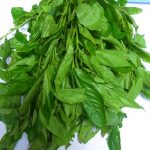Growing up in the western part of Nigeria, I became familiar with one of the most resourced westernized meal; the Ewedu Soup.
This greenish slimy limy soup is often prepared by the Yorubas and is known to have so many nutritional values. Ewedu soup can be enjoyed in different forms. Gbegiri (local beans soup) can be added to this soup for a better taste. The ewedu soup is mostly eaten with Amala.
An essential ingredient used in preparing ewedu soup is the Jute leaf which is also known as ewedu leaf. This leaf has been raved out for a lot of things.
Nutritional Facts and Health Benefits
- This leaf (Ewedu) is clearly rich in micro nutrients, and these micro nutrients aid in reducing the chances of illness in the consumer.
- The main vitamins found in Jute leaves are vitamin A, C and E, and these vitamins are key in the protection of the body from certain degenerative diseases.
- The vitamins present in Jute leaves are also known to be skin beautifying agents as they tend to increase the production of collagen, thus keeping the skin firm and beautiful.
- The ewedu leaf is an adequate source of fibre, thus making the plant very helpful in dealing with weight management and may also promote intestinal health by helping with bowel movement.
- Ewedu leaves are also known to help boost immunity and nourish the body system.
- Due to the vitamins and minerals present in ewedu leaves, they have also been said to be used in the home setting in the management of stomach related conditions such as dysentery, constipation and the likes.
- They are also used to relief pains and possess some anti tumour properties.
- The Ewedu leaf is rich in beta-carotene which supports good eyesight.
- The antioxidants present in ewedu leaves aid in the protection of the body from chronic diseases and some medical conditions.











Comments are closed.